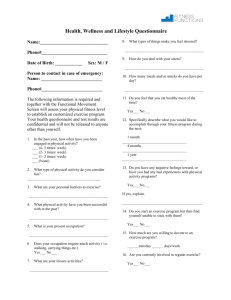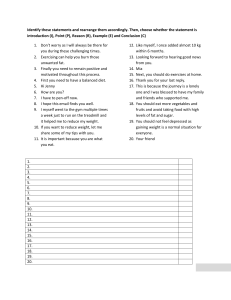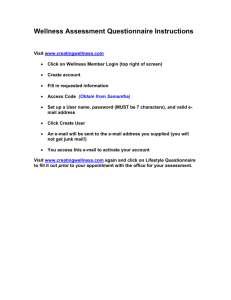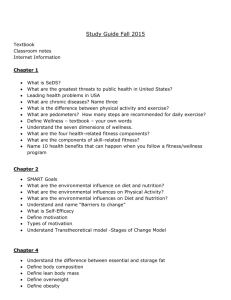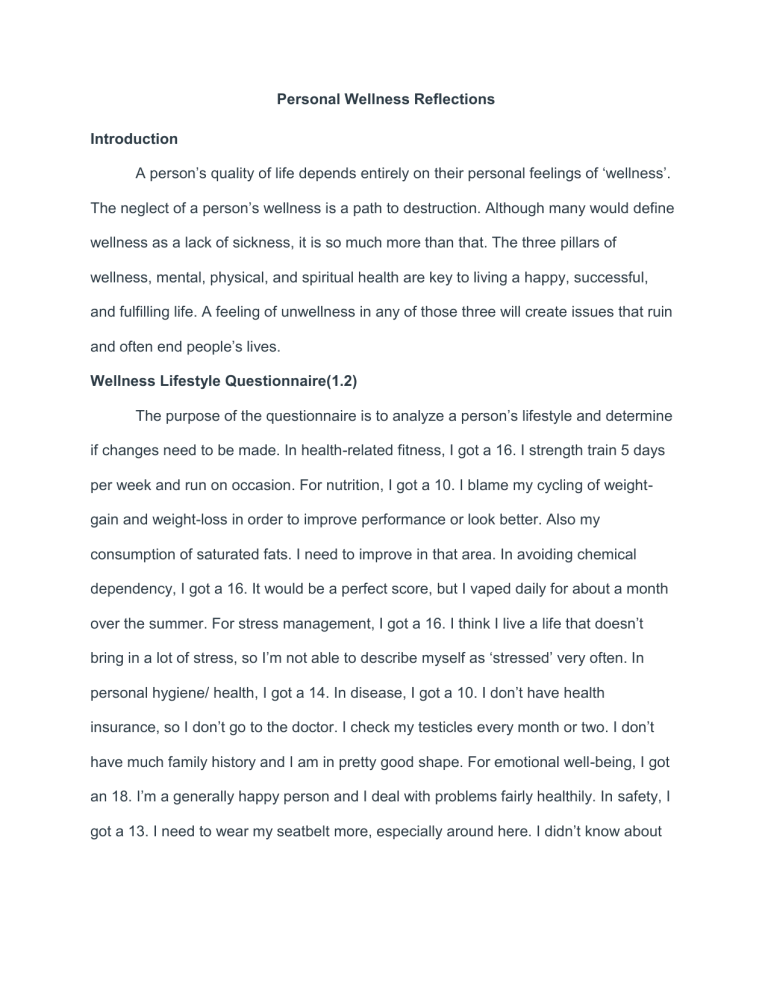
Personal Wellness Reflections Introduction A person’s quality of life depends entirely on their personal feelings of ‘wellness’. The neglect of a person’s wellness is a path to destruction. Although many would define wellness as a lack of sickness, it is so much more than that. The three pillars of wellness, mental, physical, and spiritual health are key to living a happy, successful, and fulfilling life. A feeling of unwellness in any of those three will create issues that ruin and often end people’s lives. Wellness Lifestyle Questionnaire(1.2) The purpose of the questionnaire is to analyze a person’s lifestyle and determine if changes need to be made. In health-related fitness, I got a 16. I strength train 5 days per week and run on occasion. For nutrition, I got a 10. I blame my cycling of weightgain and weight-loss in order to improve performance or look better. Also my consumption of saturated fats. I need to improve in that area. In avoiding chemical dependency, I got a 16. It would be a perfect score, but I vaped daily for about a month over the summer. For stress management, I got a 16. I think I live a life that doesn’t bring in a lot of stress, so I’m not able to describe myself as ‘stressed’ very often. In personal hygiene/ health, I got a 14. In disease, I got a 10. I don’t have health insurance, so I don’t go to the doctor. I check my testicles every month or two. I don’t have much family history and I am in pretty good shape. For emotional well-being, I got an 18. I’m a generally happy person and I deal with problems fairly healthily. In safety, I got a 13. I need to wear my seatbelt more, especially around here. I didn’t know about the rate of non-seatbelt car deaths until reading about it in the eBook. I got a 16 for the environmental health section Resting Heart Rate and Blood Pressure (1.4) The purpose of this assessment is to bring awareness to heart health. Cardiovascular issues cause one death in the US every 33 seconds on average, so it’s a good idea to be aware of your own risks. My resting heart rate was below 50 today. It is generally 46-53, but I didn’t lift weights yesterday and my body is fresh. I don’t think that this activity was as useful and eye-opening for me as it would be for someone else. If my resting heart rate was below 30, I would be in a hospital. I don’t think subtracting my RHR by 20 would be good for anyone. My blood pressure is lower than I thought, considering how much sodium I consume. I suppose I also sweat a ridiculous amount, so that could be autoregulation. Of course, I can do more cardio, but I don’t want to eat into my recovery. I lift weights often and sprinkle in tough conditioning work every 2-3 days. I think adding in a lot running right now would be too much effort for a marginal benefit. I get a good bit of cardio with the way I train. I can run a 7:30 mile once a week, so I think I’m doing okay for now. Dimensions of Wellness – Setting Your Goals (1.5) The purpose of this assessment is to bring awareness to areas in which a person may be unwell. Something like this is useful to help people determine why they may or may not be “well” and give them an idea on what to improve on. I scored 15 overall. Not ideal, but I’ve been slacking as of late. I expect that to go up when I get back into my routine. For my social wellness, I want to make more friends who are trying to improve in specific parts of their lives that could help me. For example, I’m looking for a gym partner and a study buddy in my philosophy class. I’ve been going on walks most mornings to look at the greenery around my house. I want to start going to Church here, but I haven’t found one that speaks to me yet. I’ve been slacking with my meditation for the past month or so. I used to do 20 mins 2 times per day, but now I only do 10-15 mins. I want to press 135 lbs and deadlift 365 lbs by mid-October. I think gratitude journaling would help me improve my attitude. I would describe myself as content, but I wouldn’t say I’m outwardly cheerful. School is my occupation for the moment, and I want to make it my mission to have fun in class and while studying. I get too evangelical about it sometimes and I need to start having fun with it so I don’t burn out. Stress Events Scale (12.1) The purpose of this assessment is to bring awareness of potential stressors to the person. Stress can be deadly, and it’s good to know the sources of it. I scored well with a +26. I don’t take setbacks too harshly and I have fun when I have time. I would say I lack distress in almost all of my life. I study a bit too much and I spend a little less time with my friends than I would like, but I am otherwise golden. I took on 19 credit hours this year for the purpose of seeing what kind of pressure I could handle. Perhaps I could work out with a buddy or something to socialize more, but then I would waste time in the gym. I’m not going to say everything is perfect, but it’s a matter of altering what I do for a few minutes here and there. I don’t think I need to drastically change anything in my routine to avoid unwanted stress. Stress Vulnerability Questionnaire (12.2) The purpose of this assessment is not to identify particular stressors but to identify a person’s resilience to stress. This is crucial. It is impossible to avoid stressful events in your life, but it’s a little bit easier to create a good environment to build resilience to stress.I got a 39. Good, not excellent. I think I’m in the top 5% for people in my situation in terms of stress vulnerability. I am a rock. I listen to a lot of health podcasts, and I try to incorporate their advice. Stress reduction is usually a secondary benefit to general healthy living, which is a major goal of mine. Self-Assessment Coronary Heart Disease Risk Factor Analysis (10.1) The purpose of this is to identify risk factors for the previously mentioned dangers of cardiovascular disease. Knowing is growing. I get at least 30 minutes of vigorous activity at least 6-7 times per week. The only heart palpitations I’ve ever been aware of is when I tried some pre-workout that a friend made one time. I ate 6 eggs every morning this Summer and I try to make meat at least half of every meal. I eat butter with my food when I’m trying to gain weight. I don’t eat sugar unless it’s been added to the food at the Tiger Den. I also drink half a gallon of whole milk a few days a week because I believe it’s a great weight gainer. It’s a great balance of protein, fat, and carbs. My diet is mostly centered around protein and fat intake. I cycle carbs when I need to. They make my brain slower, but boy do they give me energy in the gym. I am not diabetic. I avoid sugar to an extent that some call weird. My blood pressure is 119/77, so I’m good there. My BMI is 26.5, so I’m technically overweight. I would estimate my body fat % at around 17-19%. I’m just getting out of a bulk, but my top 4 abs are visible unflexed. I don’t think I’m unhealthily overweight to any extent. Exercising control over Your Physical Activity and Nutrition Environment (2.1) Physical activity and nutrition are the most crucial aspects of getting/keeping a healthy body (and mind, by extension). The environment one has for diet and exercise almost by itself determines a person’s health and wellness, in my opinion. I scored pretty well on the activity part. I lift most days of the week and do conditioning on nonlifting days as a form of active recovery. I’ve taken to biking to school three days per week and I park far away from everything because I refuse to pay the school for a parking pass. I feel like most of the nutrition part didn’t apply to me (maybe a lot of people say that). I’m not overweight, and while I eat a lot I don’t really see a lot of fat gain. I also haven’t cooked a meal for myself in a month since living here. I cooked for myself a lot over the Summer and I think I can go back to that easily when I have a real kitchen. I eat a lot of saturated fats and not very many whole grains, but I think I eat very well for someone that exclusively eats at the Tiger Den or UC Market. Setting SMART Goals (2.3) Nothing gets accomplished if it isn’t a byproduct of a goal. A lot of people don’t actually know how to set SMART goals for themselves. SMART goals make people much more likely to accomplish what they want to do. I want to press 135 lbs overhead by November 1st. I’m not far from it now, but I need to strengthen my triceps and shoulders, practice the movement, train it hard, and improve my bracing technique so I don’t lose power on the way up. UPDATE: As of October 23 I am able to press 135 lbs overhead thrice. My Fitness Pal – Nutrition Outcomes This is probably the most enlightening assessment for most people (myself definitely included). You are what you eat, and a body by Milk Duds and Nutter Butters is a body that will go into congestive heart failure before retirement age. I realized how habitual I am with food intake. The times that I ate changed, but that’s more because of tasks getting in the way rather than personal choice. I ate chicken or eggs with about 95% of my meals over the past few weeks. I don’t like using MyFitnessPal because I feel like it makes me too concerned over what I eat and makes me obsess over what I eat. It looked like I consumed an average of around 200g of protein, 150g of fat, and 150g of carbs. I generally had higher carb days be ones that I lifted heavy or ate with company. I want to set a good example, so I always eat like a normal person in front of my little cousin instead of eating a half dozen eggs and 3 pb&js for lunch. I ate almost 3,000 kcal per day, but it was close to 2,250 on maintenance days and nearly 4,000 on high-intensity days. I didn’t track tiny snacks, but I don’t think there was a whole lot of that throughout these past few weeks. There are a lot of sources that vary on optimal protein intake for muscle growth, but I stuck to a very liberal amount of >1g/lb of body weight. That’s partly because I find protein more satiating. I think it’s most moral to eat exclusively animal products that are ethically sourced, but that’s hard to do at the Tiger Den. I eat a few vegetables (about 3-5 servings per day), but mostly meat, eggs, and dairy. I destroyed a whole loaf of bread, a large jar of peanut butter, and half a jar of jelly in a week more than once. My sugar intake is all over the place, with some days having <5g and some being closer to 100g than 50g. I definitely need to watch my sugar intake, but it helps me meet my daily calorie goals. Update: I donated blood a few weeks after writing and found that I have high levels of iron in my blood. What a surprise. Disease Risk Using Waist Circumference and BMI (4.2) This assessment can be useful to reliably determine the likelihood of illness for most individuals. I’m not going to caliper myself up. Using an online body fat % chart, I estimate that I’m between 15 and 20 percent body fat. My BMI is 27. I am fine with my size and weight. I think I look great, but I definitely realize that the amount I eat is less than optimal. I could stand to lose 15-20 lbs in order to lower my BMI to “normal weight”, and lose a lot of my gains in the gym in the process. I think I’m healthier than a lot of people at my height with a “normal weight”, so I’m not at all worried. My Fitness Pal Physical Activity – Outcomes This assessment is useful for people to understand the amount of calories that they burn a day. While I understand that this is useful, it is an imperfect method and should not be seen as an all-inclusive equation for gaining or losing weight. I walk at least 10,000 steps every day just walking from place to place around campus. I biked to school every day, but 2 days ago my pedal fell off of the left crank arm. It’ll probably be a few weeks before I can replace it. I didn’t track the calories I burned at the gym. I mostly try to avoid doing cardio at the gym. I’d rather do it outside. I’ve been running once a week most weeks so I don’t lose my cardiovascular fitness. I want to ramp it up this Winter and do “Run Fast, Squat Heavy” by Adam Klink. Just yesterday, I walked nearly 12,000 steps and burned 600 calories doing so. Personal Reflection on Exercise and Exercise Enjoyment (9.1) This assessment is useful for a person to define what exercise does for and means to them. I would say that I enjoy exercise of all kinds. I used to run a lot, but after chronic injuries, I’ve dialed it back a lot. I try to run once a week and bike often. I prefer lifting weights to other forms of activity, mostly because the effects are much more obvious short-term benefits (muscular “pumps”). I loathe indoor cardio. It’s boring. I don’t like working out with people that aren’t “at my level”, if that makes sense. I don’t like holding back or constantly changing the weights each set or getting distracted. I like talking to people when I lift, I just don’t like lifting with most other people. I enjoy running with friends, though. I would consider myself fairly competitive, but I try to keep that under wraps when I’m with other people. It makes me look mean sometimes. I like the way I work out and don’t plan on changing it until my results diminish. I’m focusing a lot on “general physical preparedness”. I’m trying to pursue an even mix of strength and conditioning while trying to create a smooth transition into more endurance and strength-based work. I like to plan ahead, choosing workout programs that I think would be enjoyable and help me reach my goals a few months in advance. The term “trendy boutique gym” is oxymoronic to me. Something about it just irks me as a person that has worked out in a dusty garage with a leaky roof and old equipment found on Ebay. I get intensely annoyed if I know I’m going to have to reschedule a workout. Sometimes I do the bodyweight equivalent of what I was going to do in the gym that day, but 12count burpees are a far cry from a log clean and press. Personal Fitness Plan (9.2) This assessment can be used to develop a personal fitness plan, which I use in a form nearly every day. Planning is the first step to doing, and most people will take the path of least resistance and avoid pushing themselves unless they have something that tells them exactly what to do. My cardio is solid, but it could be better. I have no problem biking to school every day, but a 6-minute mile would not be possible. I plan on running more in a few weeks, but I want to keep the volume low to avoid re-re-injuring my shins. My muscular fitness is stellar compared to what is said in the book, but I’m not strong enough in my own eyes. That is the main area I want to improve. My flexibility is good but it could be better. I can do an AtG squat no problem, but I avoid doing those heavy. I can touch my toes and my lat flexibility has been improving drastically after I started doing heavy dumbbell pullovers. I train cardio once a week, I lift weights 4 times per week (muscular fitness and flexibility to some extent). I plan on doing Adam Klink’s “Run Fast, Squat Heavy” program. I don’t see myself running any 5 minute miles, but I would like to run at a sub-7 mile pace. It would have me run 3x/week and squat 2x/week. I would supplement this with “10-count burpee-chins” on my off days to maintain upper body strength and further my conditioning. I would also do some flexibility work as a cooldown Are You Taking control of Your Lifestyle to Prevent Cancer? (11.1) Cancer is one of the biggest killers in the world. Any actions that increase its likelihood should be brought to people’s attention to help them avoid an early death. I eat a good bit of fruits and vegetables, but I also eat a lot of red and processed meats. I drink a lot of water during the day, and I like to drink coffee, sometimes black, sometimes buttered (it sounds gross, but it tastes really good and I know a few people who swear by the health benefits). I am very active, but my BMI is almost 28, but I would estimate my body fat % at 18-22%. I go outside for a while every day, almost always more than 30 minutes. I worked outside for 10 hours a day over the summer, so I definitely had a lot of sun damage. Nobody in my family knows that they have cancer. Early Signs of Illness (11.2) This questionnaire is useful for people who are unsure of whether or not they’re unwell. I’ve never felt better. I donated blood a week ago, so I’m not at 100% cardiovascularly. With that being said, everything else feels great. I sweat a lot, but I chalk that up to sweating a lot doing landscaping this Summer, working out a lot, and drinking caffeine around half of the time Addictive Behavior Questionnaire (13.1) This questionnaire is useful for people that are former, current, or potential addicts. It may be better used by people around the ones it was made for, though. I scored pretty well, but the wording of these questions is very particular. I used to smoke weed multiple times a day, and I would say that I was addicted. I quit, but I have done a few of these things in the past. I don’t really think this quiz would be effective for most people with a drug problem or high potential for one, as they would easily just lie to themselves or others, likely because of the strong wording of the questions. The wording reminds me of when I sought help from a high school guidance counselor for weed. I find that most popular sources for abuse recovery/assistance are not very effective. I haven’t seen a single person clean up a drug habit by going to a counselor/therapist. If anything, they just quit doing that and go to harder drugs because they tend to be cheaper and therapy is expensive. Alcohol Use Questionnaire (13.2) This questionnaire is useful for people who consume alcohol. It is useful to know the degree of severity of a person’s alcoholism, social drinking, etc. I’ve had less than a dozen “drinks” in my life. Both of my parents used to drink heavily, and most of my friends’ parents did. There was an alcoholism epidemic in our town, so most of the younger generations stuck to non-alcoholic intoxicants. Hence the weed addiction in high school. Life Expectancy (15.1) This gives people an indicator of the track they’re on in life and can give people a wake-up call to change their lifestyle if need be.I have a life expectancy of 79 years, according to this activity. My real physiological age is 10 years. I disagree with the weighting of a lot of the criteria, but I’m not a doctor. I think I’m much healthier than people who may have gotten a higher score than me, but because I eat red meat and don’t eat breakfast daily I got a low score. Summary and Conclusions I think I am a generally very healthy person. I am very in tune with my body when it comes to training and am very motivated to work out. I think I am a very active person. My diet could be better, but I don’t trust a lot of the food at the Tiger Den so I try to eat more meat than anything there (they douse the food in vegetable oils, and I would be surprised if they were high quality oils. I’d rather eat poor quality meat than poor quality vegetables/vegetable oils). My eating habits have mellowed out a good bit now that I’m not really trying to gain or lose weight. I drink a lot of water. I avoid stress when I can, but I think I would score a bit worse on the stress questionnaire than I did a few weeks ago. My sleep has been less consistent, but I think that’s expected when nearing the end of the semester. My resting heart rate is in the high 40s. My BMI could be lower, but I think I’m doing great in terms of fat to lean body mass. I would say that the one change I plan on making in my lifestyle is to start running more. I was procrastinating starting the habit under the guise of protecting my shins, but I just signed up for a 5k with one of my buddies in the Marines and there’s no chance I’m going to let him outrun me. I plan on doing around 8 miles per week until I feel comfortable putting more stress on my legs. Then I’ll probably peak at 15 miles per week. Thanks for reading all of this. Sorry there’s so much of it.
